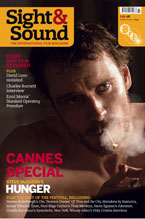
July 2008
Please view our back issues page for more information about obtaining previous months issues, dating back to 1995.
Features
 Cannes 2008: A royal rumpus
Cannes 2008: A royal rumpus
British cinema held its head high at this year's Cannes, with remarkable debuts from Steve McQueen and Duane Hopkins, and a moving return from Terence Davies. By Nick James
 David Lean
David Lean
To many he is the embodiment of British cinema. In this issue's two-part celebration of David Lean, Charles Drazin looks at how the director learned his trade in the editing room and Sonia Genaitay explains the processes used to restore some of his earliest films
Blues people
Charles Burnett's 1977 debut film Killer of Sheep is a landmark of American independent cinema directed by one of black cinema's most visionary talents. As a BFI Southbank retrospective arrives, Burnett talks to James Bell
Beyond the frame
Much of Errol Morris' documentary output probes the nature of photographic 'truth' - a theme with profound political resonance in new film Standard Operating Procedure, about the infamous images of prisoner abuse at Abu Ghraib. The director talks to Howard Feinstein
Cannes 2008: He who dares
If Cannes 2008 failed to match the brilliance of last year's festival it was still full of promising works-in-progress, shifts in direction for name auteurs and a handful of films of rare quality. By Nick James PLUS Rose Pastille's hot gossip
Cannes 2008: Canned heat
Kieron Corless celebrates the continuing tradition of radicalism of the Directors' Fortnight
Cannes 2008: Heart of the matter
Geoff Andrew finds himself moved by a selection of films designed to make the watcher weep
Cannes 2008: Young guns
Jonathan Romney is shaken by the intense Johnny Mad Dog, a brutal and brilliant account of child soldiers in war-torn Africa
Selected reviews
 Couscous
Couscous
Abdellatif Kechiche's perfectly paced story of a North African family's struggle in coastal France is told with the wit and warmth of classical cinema, yet with a very modern take on identity. By Ginette Vincendeau
 DVD Review: Pied Piper
DVD Review: Pied Piper
Jacques Demy's interpretation of the Pied Piper fairytale is deeper and darker than you might expect, says Tim Lucas
Reviews in this issue:
- Adulthood
- Banquet
- Cassandra's Dream
- The Chronicles of Narnia Prince Caspian
- A Complete History of My Sexual Failures
- Couscous
- Deception
- Doomsday
- The Edge of Love
- Female Agents
- The Forbidden Kingdom
- Her Name Is Sabine
- In Memory of My Father
- Iron Man
- Made of Honour
- Married Life
- The Mist
- Mouth to Mouth
- My Winnipeg
- Nim's Island
- Numb
- The Oxford Murders
- Pathology
- DVD Review: Pied Piper
- Prom Night
- Rebellion The Litvinenko Case
- RFK Must Die The Assassination of Bobby Kennedy
- The Ruins
- Shutter
- Speed Racer
- Superhero Movie
- Taxi to the Dark Side
- Teeth
- Timber Fall
- 21
- The Visitor
- What Happens in Vegas

 The Edge of Love
The Edge of Love My Winnipeg
My Winnipeg